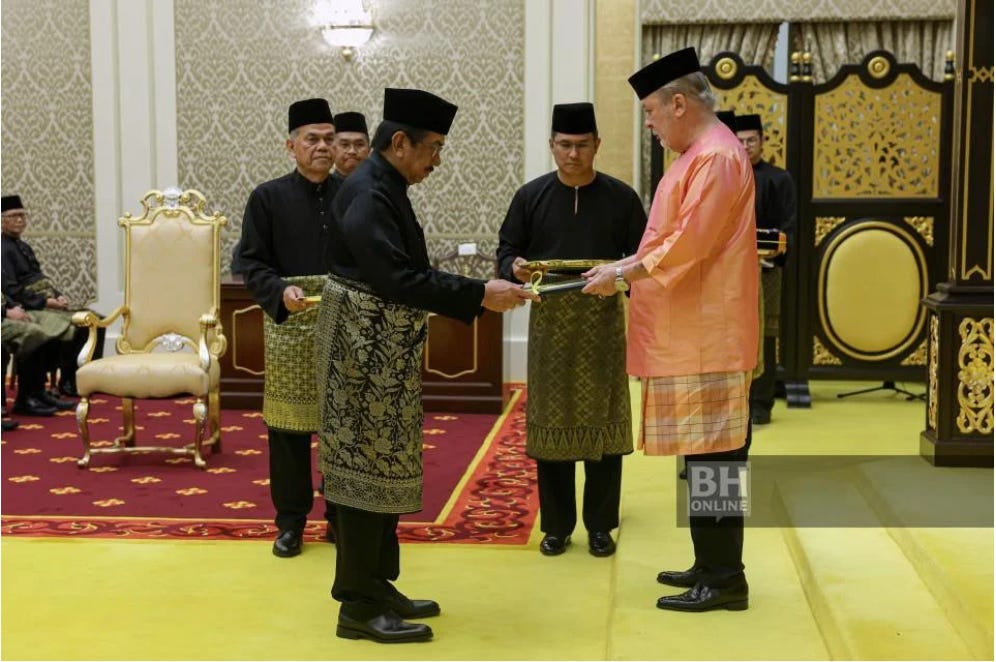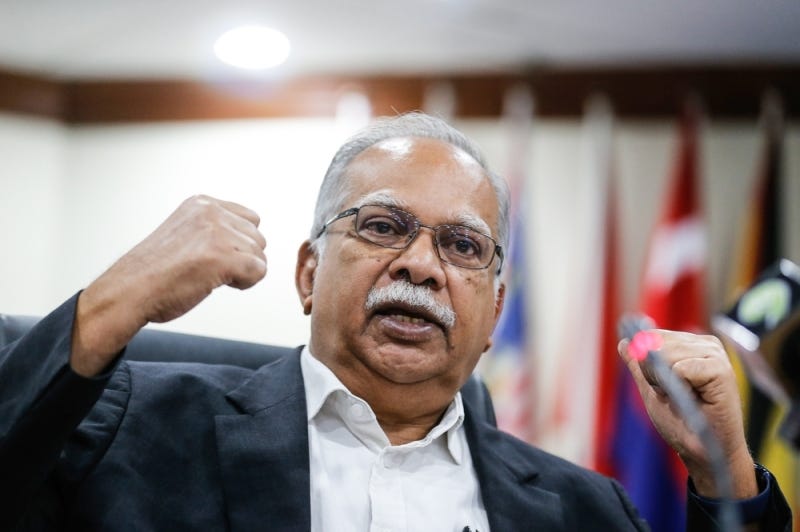Guest Editorial: Sabah and Sarawak: navigating federalism amidst peninsula political intrusion
Prof. Dr. Ramasamy
Does Musa Aman’s appointment as Sabah Governor symbolise neo-colonialism?
Sabah and Sarawak: navigating federalism amidst peninsula political intrusion
The political dynamics between Sabah and Sarawak in Borneo and Peninsular Malaysia have long been fraught with tension, exacerbated by the incursion of peninsula-based political parties into the eastern regions.
The presence of these parties—UMNO, PAS, DAP, and PKR—has introduced divisive ethnic and religious politics, threatening the social cohesion and unique political landscape of Sabah and Sarawak.
The Democratic Action Party (DAP) and Parti Keadilan Rakyat (PKR) have attempted to establish themselves in these regions but have faced significant pushback due to their peninsula-centric ideologies.
The DAP, while proclaiming itself as a champion of multiracial politics, often functions as a party for the Chinese community. This approach alienates the local Chinese population in Sabah and Sarawak, who have historically shared a closer bond with indigenous communities than their counterparts in the peninsula.
Similarly, PKR’s brand of multiethnic politics has struggled to resonate with native communities, as it is perceived as overly influenced by Peninsular Malaysia’s sociopolitical context.
On the other hand, UMNO and PAS have introduced even more contentious forms of politics.
UMNO’s foray into Sabah has been particularly disruptive, fostering corruption and money laundering among local elites.
Its divisive ethnic and religious politics, which have historically polarized communities in the peninsula, are ill-suited to Sabah’s and Sarawak’s multicultural and multireligious societies.
PAS, with its strict Islamic agenda, finds little appeal among the cosmopolitan and religiously diverse populations in these regions but still poses the potential for sowing discord.
The entry of these peninsula-based parties has not only deepened divisions among natives but also diluted the distinct political identity of Sabah and Sarawak.
Historically, these regions have maintained political autonomy by resisting the encroachment of peninsula-based ideologies.
However, in recent decades, the gradual but persistent incursion of these parties has eroded this autonomy, making the political landscape increasingly resemble that of the peninsula.
This political meddling compounds the grievances arising from the unequal federal arrangement established under the Malaysia Agreement 1963 (MA63).
While some progress has been made in addressing the agreement’s ambiguities, fundamental issues such as equitable resource sharing and representation remain unresolved.
The federal government’s failure to evolve the terms of MA63 in response to changing political realities has fueled nationalist sentiments, with many in Sabah and Sarawak calling for greater autonomy or even secession.
For instance, Sabah and Sarawak contribute a significant share of Malaysia’s oil and gas revenue—estimated at over 20% of the national total—but receive disproportionately low federal allocations in return.
Additionally, their parliamentary representation remains limited, with only 25% of seats in the Dewan Rakyat, despite the regions constituting nearly 60% of Malaysia’s landmass.
The intrusion of peninsula-based political parties into Sabah and Sarawak is not only unnecessary but counterproductive.
Instead of fostering national unity, these parties have exported their brand of divisive politics, undermining social harmony and accelerating centrifugal tendencies.
If the peninsula political parties truly respect the unique identity and aspirations of Sabah and Sarawak, they must withdraw from these regions and allow local parties to represent their people’s interests.
A reconfiguration of federalism is urgently needed—one that respects the autonomy of Sabah and Sarawak while addressing their longstanding grievances.
Beyond resolving the loopholes in MA63, the federal government must pursue structural reforms to ensure fairer resource distribution, greater political representation, and respect for regional autonomy. Only then can Malaysia move towards a more inclusive and equitable federation.
Prof. Dr. P Ramasamy
Malaysian, 75 years of age. Former professor of political economy UKM. Former Senior Research Fellow, ISEAS. Former Visiting Professor, University Kassel, Germany. Deputy Chief Minister Penang, 2008-2023. Former member of parliament, 2008-2013. Three terms Perai state assemblyman. Former Chairman of Penang Hindu Endowments Board. Involved in peace talks in Aceh and Sri Lanka. International peace consultant. Chairman of political party Urimai.
Subscribe Below:





If Taib can be appointed as governor of Sarawak despite the scandals on his abused of power and accumulation of excessive unexplained wealth, why it is so surprising if Musa Aman was given the same privilege to be head of the state. The elitist Malays function is to help themselves to all the riches of the nation. Politicians ultimate goal is to help themselves, as if they are the lord of the land, just as the British set as an example to plunder the nation's wealth. What politicians fail to appreciate is that no matter how much you dared and succeeded in accumulating for themselves from acquiring all millions in land or bank accounts, what count the most before is what kind of life you live while you are in power? While in power the politician still eats one meal, sleep in one bed and wear a pair of shoes in his feet at any one time,once he stops breathing, nothing belongs to him. He is just a temporary trustee of all the materials riches in his name, nothing more, nothing less.
If a man is after money, he's money mad; if he keeps it, he's a capitalist; if he spends it, he's a playboy; if he doesn't get it, he's a never-do-well; if he doesn't try to get it, he lacks ambition. If he gets it without working for it; he's a parasite; and if he accumulates it after a life time of hard work, people call him a fool who never got anything out of life. Vic Oliver (8 July 1898-15 Aug 1964)
Many years after the politicians have died, how will be remembered as history seems fit to record down as his achievement?
It seems most politicians are literate and are able to read and write and write a signature below their names. But to be of any positive value to mankind and his own future generations, how rich one dies, is not that important, what really counts are of three mental resilience which makes a man a real man of any value or substance for future generations.
“The illiterate of the 21st century will not be those who cannot read and write, but those who cannot learn, unlearn, and relearn. ”
― Alvin Toffler (4 Oct 1928- 27 June 2016)
He who will not reason, is a bigot; he who cannot is a fool; and he who dares not is a slave. Sir William Drummond (26 Sept 1769-29 March 1828)
. Attachment is the great fabricator of illusions; reality can be attained only by someone who is detached. Simone Weil (3 February 1909 - 24 August 1943)
Attachment of any kind be it obsession with wealth, position or popularity is what make a politician, what he is- that prevents him from really enjoy life.
I am grateful for what I am and have. My thanksgiving is perpetual. It is surprising how contented one can be with nothing definite - only a sense of existence. Well, anything for variety. I am ready to try this for the next ten thousand years, and exhaust it. How sweet to think of! my extremities well charred, and my intellectual part too, so that there is no danger of worm or rot for a long while. My breath is sweet to me. O how I laugh when I think of my vague indefinite riches. No run on my bank can drain it, for my wealth is not possession but enjoyment.”
― Henry David Thoreau (July 12, 1817 - May 6, 1862
The Sultan of Johor as King of Malaysia signifies a return to British colonialism. He is for the better part an Englishman with a generous serve of the remaining 37 varieties like Heinz Baked Beans. Rurks, Central Asians etc etc